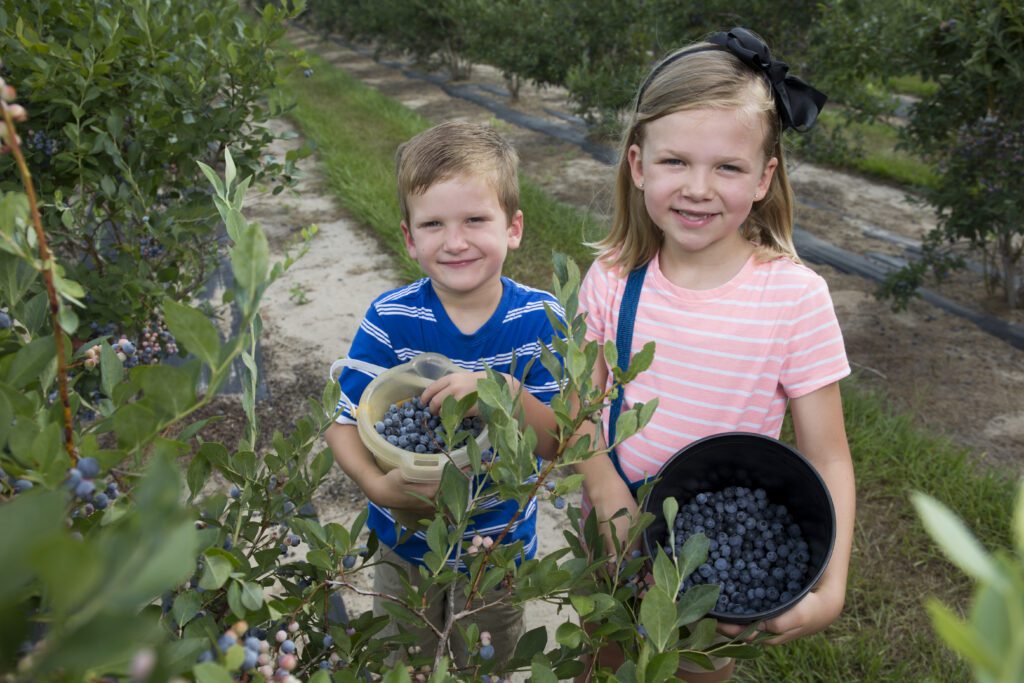by LUIS RODRIGUEZ
photo by TYLER JONES, UF/IFAS
Many farmers are considering agritourism as a new source of revenue for their farms aside from their regular agricultural activities. An “agritourism activity” means any agricultural-related activity consistent with a “bona fide” farm, livestock operation, ranch, or in a working forest that allows members of the general public to do recreational activities, entertainment, educational activities, ceremonial activities, exhibitions, harvest-your-own crops (U-pick), and other related agricultural activities.
The Florida Agritourism Law
Since 2007, the Florida Legislature has recognized the importance of and the need for changes to the statutes that would allow farmers to open their farms to visitors while still being able to protect the public from negligence. Because of this, in 2013, the Florida Agritourism Law was created. This law is addressed in the Florida Statutes 570.85—570.89. Any bona fide farmer can benefit from the Florida Agritourism Law. On the other hand, it is always important to verify local laws and regulations. To read the agritourism statutes, go to https://bit.ly/3SAyx9k or scan the QR code:
Agritourism Activities
Several activities are considered to fall under agritourism. A farmer can provide one or more distinct activities in one location as long as the farm complies with specific laws and regulations depending on the activity. Some of these activities include:
- Overnight lodging – This includes bed & breakfast, motels, hotels, or any other stay-the-night activities. When offering overnight lodging, the farmer must comply with all the laws and regulations involving this type of activity.
- Retail sales of farm products – Farmers can invite visitors to their farms and sell their products within the premises. Local or state permits may apply depending on the products on sale.
- Farm tours or other recreational activities such as fishing and hunting – Any recreational activity within the farms will fall under agritourism.
- Meetings and events – The farm can be a place for groups or associations to hold their meetings. Seasonal events such as festivals are also part of agritourism.
- Educational activities such as workshops or training – Educational tours related to the crops on the farm or about the history of the farm are also considered to be part of agritourism.
Advantages of Agritourism
Some of the advantages when implementing agritourism could include the following:
- An additional source of income – Farmers will not only gain money from selling their products but also when having visitors.
- Increasing revenue without having to increase the size of the farm – Farmers can gain more money without the need to buy new land.
- Additional marketing for farm products – Recognition among the general public could increase sales of the farm.
- Increase awareness about the importance of agriculture – Educate the general public on the problems affecting agriculture and how they can help to address issues.
Considerations When Implementing Agritourism on Your Farm
When implementing agritourism, some of the things a farmer must take into consideration are the following:
- A farmer should be willing to devote the hours necessary for their agritourism activity – Working on weekends, holidays, and/or after hours may be important to the agritourism activity.
- What resources a farmer can offer in terms of land, crops, and services – Every farm is different, and any natural resource or asset of the farm could be an attraction to visitors.
- Be willing to work with the public – Good interaction with visitors is essential for the success of the agritourism activity.
- Be willing to share aspects of the farm with others – Visitors will want to know how the farmer operates the farm. Although certain things can always remain a secret, the farmer will have to be willing to share specific aspects of the farm with visitors.
- Consider a business partner or family help – Agritourism involves many moving pieces; working with others could help create successful activities.
- Florida’s climate – Florida is hot and humid. Farmers should consider this before implementing activities.
- How affordable the agritourism activity will be, for both the farmer and the customers – Provide a fun and affordable activity but make sure not to overspend to make a profit.
- Understand the target audience for a specific agritourism activity – Depending on the activity you are offering, target specific audiences such as families.
Other Considerations
Any farmer can implement an agritourism activity within their farm, and local governments are prohibited from restricting operations on lands classified as agricultural from engaging in agritourism. On the other hand, farmers must follow all the laws and regulations depending on the type of activity within their farms. It is also important to have insurance to protect your investment and have agritourism signage for all the agritourism activities within the farm. The agritourism law does not prevent the public from suing a farmer, it protects the farmers from any legal problem if they comply with the law. Furthermore, agritourism does not include the construction of new additional structures or facilities intended primarily to house, shelter, transport, or otherwise accommodate members of the public.
Florida Agritourism Association
The Florida Agritourism Association is a statewide group and was founded in 2013 to create awareness of opportunities for Florida agritourism operators. They support the growing agritourism market in Florida and their vision is to create an organization that will promote members of agritourism operations and at the same time protect and expand the ability of farmers to get involved in agritourism. For more information about the Florida Agritourism Association, visit their website at https://visitfloridafarms.org/
Luis Rodriguez is the Polk County Small Farms and Pesticide Education Extension Agent. You can reach him at lrodriguezrosado@ufl.edu.

